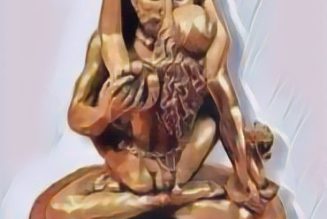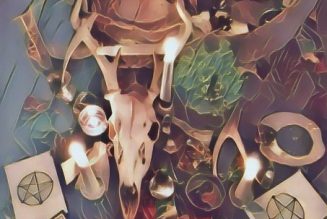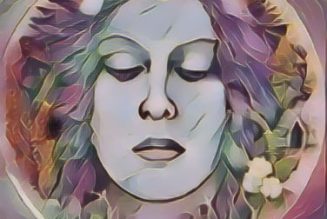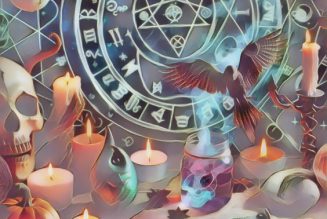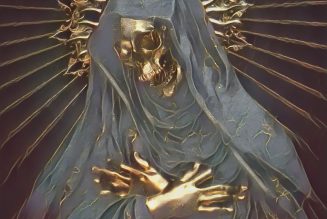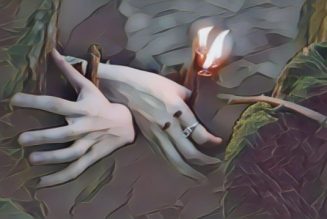The Terms of witchcraft are meant to transport the practitioner into the heart of life itself, where words are ultimately limitations and qualifiers.
More specifically, they can guide practitioners toward a direct mystical experience of deity, nature, and the individual spirit.
Words are obliterated and become meaningless when the practitioner achieves this experiential state of understanding.
Witches therefore first come to accept that words are only valuable as signposts and guides that point toward mystic experience.
To Witches, a word is not reality itself.
For example, the word “apple” is not itself an apple.
You can hear the word and understand it intellectually.
However, in order to know an apple, you must hold it in your hands, smell it, and take a big juicy bite.
Likewise, the word “god” is not the deity itself.
It is only a mental abstraction, a convenient symbol that we can all use to refer to something that goes beyond the word.
As you walk the Witches’ path, you will eventually have your own experiences of direct mystical contact with the divine.
But before that happens, it is understandable and natural that you might struggle with the language of Witchcraft, which often flies in the face of convention and social norms.
As a practice, today, take a look at the list of words that follow:
Witchcraft, Ritual, Magic, Occult, Pagan, Spell.
Regarding each of these words, explore the following questions:
• What is my comfort level in using each word?
• How do I understand each word?
• How do I imagine that each word impacts other people who are not involved with Witchcraft?
Take time to commit your feelings (whatever they may be) about each word to paper.
Witchcraft
Witchcraft can be seen as many different things to many different people
In itself, and among other things, Witchcraft can be termed not only as a magical practice but also as a spiritual lifestyle and at times as a religion of nature.
In its spiritual tradition Witchcraft can be seen as being centered on the earth-based, mystic practices of the people of Old Europe.
Witchcraft can also be a shamanic spiritual path.
The word “shaman” is an anthropological one that refers to a type of indigenous, natural-magic practitioner.
A shaman is a person, usually in a tribal culture, who is a healer and an interpreter of the unseen world (which shamans refer to as the world of spirits). She or he conducts rites of passage, divines the future, and walks the path of magic.
Many Witches understand the natural world, the sun, the moon, the seasons, male and female bodies, and the earth itself as expressions of sacredness.
Learning to live in conscious connection with all of nature (including human nature) within each moment can help witches forge a deep bond with the divine.
Witches simple spiritual practices such as meditation and mindfulness in daily activity help them acquire mental, emotional, and spiritual flexibility.
Witches practice bending and shaping their consciousness so that they live in accord with each moment of life.
Witchcraft Throughout the Middle Ages and particularly during the Renaissance period, the word “Witchcraft” was liberally applied by the Christian church and its authorities to the native religious practices and customs that existed for thousands of years before Christianity.
Many people with indigenous European spiritual roots met their fates on the gallows or in the fire simply because of their religious expression.
Aside from practitioners of native spiritual beliefs, there were other groups of people that the church targeted, tortured, and burned for the crime of “Witchcraft.”
One might be accused of Witchcraft simply because of a bad dream, or because one was left-handed or had bodily imperfections (believed to be “devil’s marks”).
Jews, Gypsies, homosexuals, unwed women, midwives, herbal healers, social out- casts, people who were too rich or too poor, the disabled, and the infirm were also convicted for the crime of “Witchcraft.”
Some scholars claim that over 250,000 people were put to death for the crime of Witchcraft during the “burning times” in Europe, while others say the number reached as high as nine million.
The contemporary spiritual practice of Witchcraft is based on many of the old customs and folk wisdom of old Europe.
Because of this, practitioners have reclaimed the word “Witch.”
Contemporary practitioners view the word as one of power and they re-claim it in an effort to be mindful of the cost of religious intolerance, to release negative associations, and to forge a new future.
At times power for witches, has little to do with control over people and things.
Power is a natural state of being that comes from uniting with the vast flow of nature and operating from an experience of accord with that flow.
For many In the Witches’ view, power is shared, subtle energy that flows through all things.
Ritual
Ritual is the enactment of a myth. In this definition, the word myth refers to a system of spiritual symbols.
Rituals in Witchcraft usually involve symbolic words, sounds, colors, and gestures.
Witches understand that each element of a ritual speaks the language of the deep mind (the unconscious mind), and thus awakens the movement of psychological and spiritual energy.
The symbols in the Witches’ rituals emerge from both time-honored, shared mythological correspondences (for example, traditional associations that orient the practitioner to time, place, color, sound, and movement) and personal associations that can emerge from dreams, meditations, and personal insights.
Magic
Magic is a term that sometimes causes confusion and fear.
Many people recall scenes from movies, television shows, or fairy tales when they first think of magic.
In the popular imagination, magic is about getting things that you want through forbidden, dark, or dangerous forces.
Witches understand magic as a natural process.
It is the ability to change one’s consciousness—one’s frame of mind.
It is the ability to arrive at substantial realizations and broadening insights that change one’s relationship as a human being to the world.
Out of one’s change of consciousness comes a change in the world.
The processes of magic reveal the internal patterns that can help us to live in close contact with our full human power.
The methods of magic are simple.
Lighting candles, chanting, or focusing one’s intention with drumming or dancing are all methods that Witches use to create magic and change.
Occult
The word “occult,” derived from the Latin occultusanum, literally means “secret.”
Few Witches today use this term when referring to their contemporary magical or spiritual practices.
However, the word refers to hidden teachings that are available to adepts of any magical or metaphysical path.
Pagan
Pagan comes from the Latin paganus, a peasant or country dweller.
Formerly people used the word in reference to a non-Christian.
The word then expanded over time to pejoratively mean anyone who was not “of The Book,” namely a person who was not a Christian, Jew, or Muslim.
It gained negative connotations over time and came to mean someone who was an uncivilized “idolater.”
In contemporary practice, a pagan is someone who follows a polytheistic, pantheistic spiritual system.
Typically, a pagan is someone who believes that the universe, the earth, and all of its inhabitants contain divinity.
Spell
A symbolic act through which anyone can channel nonphysical energies to attain some particular goal.
